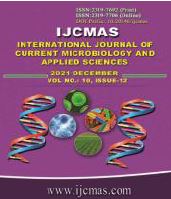


 National Academy of Agricultural Sciences (NAAS)
National Academy of Agricultural Sciences (NAAS)

|
PRINT ISSN : 2319-7692
Online ISSN : 2319-7706 Issues : 12 per year Publisher : Excellent Publishers Email : editorijcmas@gmail.com / submit@ijcmas.com Editor-in-chief: Dr.M.Prakash Index Copernicus ICV 2018: 95.39 NAAS RATING 2020: 5.38 |
A biotic stress due to sodium azidemay inhibit bacterial growth, but also can induce some physiological reactions and some fatty acids production. Escherichia coli is Gram-negative bacteria carries Acetyl-CoA gene which is translated into Acetyl-CoA carboxylase (ACC) “a biotin-dependent enzyme” that catalyzes the irreversible carboxylation of acetyl-CoA to produce malonyl-CoA. This compound is the first step in fatty acid production. Different concentrations of sodium azide mutagen were applied to E. coli to estimate the variation in Acetyl-CoA gene sequence comparing to control. The sequencing results were subjected to TCOFFEE tool in Jalview software to assess the multiple sequence alignment. As a measure for gene variation due to mutation treatment, we estimated the fatty acids produced from the mutant bacterial strains comparing to control. The GC-MS profile of the fatty acids concluded that both control and 250 µg/ml mutant bacteria showed the highest concentrations of some fatty acids, where 125 µg/ml mutant bacteria showed complete inhibition in fatty acid production. Besides, RAPD-PCR molecular marker was performed to estimate the general genetic variation in the mutant E. coli comparing to control. Sodium azide treatment resulted in a total polymorphism percentage of 77.97%. This percent explained the high genetic variation in the total genome content of azide-mutant E. coli comparing to control. The net results from this work that in a certain concentration of sodium azide treatment (250 µg/ml), the production of some essential fatty acids increased.
 |
 |
 |
 |
 |